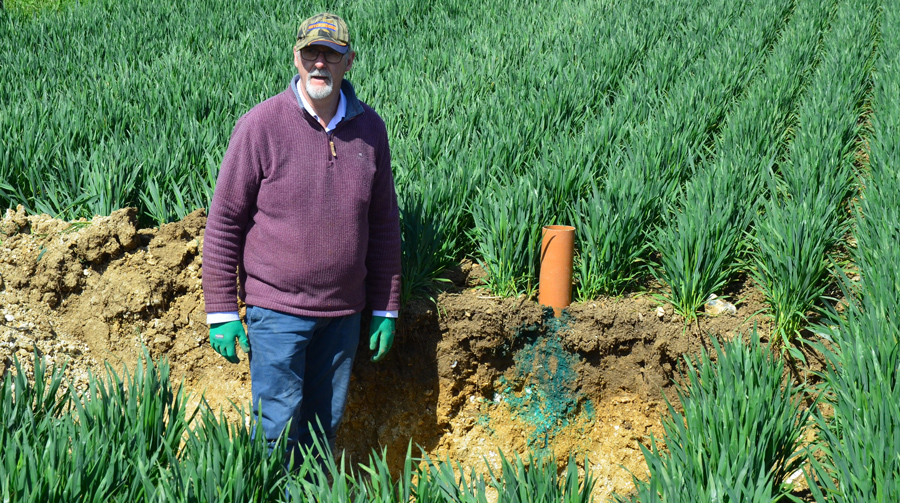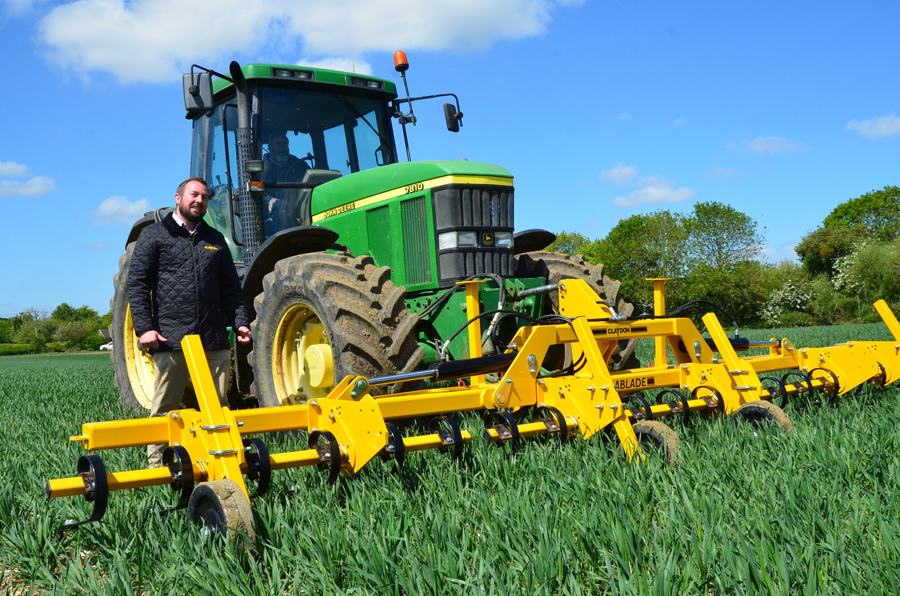Claydon’s Virtual Open Day highlights the importance of soil health
29th May 2020
“The future viability of the agricultural sector will depend on growers embracing more environmentally and financially sustainable crop production systems,” farmer and strip seeding pioneer Jeff Claydon, emphasised during the filming of a Virtual Open Day at the Claydon factory.
“The future viability of the agricultural sector will depend on growers embracing more environmentally and financially sustainable crop production systems,” said farmer and strip seeding pioneer, Jeff Claydon, during the filming of a Virtual Open Day at the Claydon factory and 340-hectare arable enterprise at Wickhambrook, Suffolk, in May.
Innovative, family-owned company Claydon normally hosts a series of annual open days attended by hundreds of farmers from all over the UK and overseas. This year, however, the Covid-19 lockdown meant that the events planned for 22nd and 23rd April 2020 had to be cancelled, so another way had to be found to enable them to experience Claydon’s latest developments and innovations. Instead, it filmed a Virtual Open Day to enable farmers to experience the latest developments without travelling.
Themed around ‘Soil: its health, our future’, the event incorporated a range of soil, crop and machinery-related presentations, which are available to view online by going to www.claydondrill.com and clicking the ‘Claydon Open Days’ icon on the home page.
The event started with a presentation by Jeff Claydon on the importance of optimising soil health and how to achieve it. During a tour of the Claydon farm, Dick Neale, technical manager for leading agronomy company Hutchinsons, also emphasised the importance of soil health and soil structure, how to assess it, and the role of cover crops.
The Virtual Open Day also saw export sales manager Simon Revell discuss how worms are nature’s indicators of good soil health, while commercial director Spencer Claydon outlined how the company’s TerraBlade inter-row hoe provides a low-cost, mechanical method of controlling weeds in combinable, band-sown crops. Oliver Claydon, operations and manufacturing director, then talked through the key benefits of the Claydon Hybrid drill, the cornerstone of the Claydon Opti-Till System.
As a supplier of agricultural machinery and spare parts to farmers, Claydon is an essential business for helping to ensure that the agricultural industry can keep supplying food to consumers and processors.
The company has therefore been able to keep its design, manufacturing and service centre operating at capacity throughout the current crisis whilst following government guidelines on safe working during the pandemic. With support from its global dealer network the company continues to manufacture its range of tractor-mounted and trailed Hybrid seed drills, Straw Harrows, TerraStar light rotary cultivators and TerraBlade inter-row hoes which are marketed and sold by the company’s commercial team.
Adapting to the new normal
“The Covid-19 lockdown has given many people in society, including farmers, a lot more time to think about what is really important in life, re-evaluate how they work, and consider how they can operate more efficiently, effectively and sustainably,” Jeff stated.
“Consumers are now much more aware that good food and clean water are amongst life’s few basic requirements, what it takes to ensure that a continuous supply of high-quality products reaches retailers’ shelves and how easily and quickly that supply chain can be disrupted. It has also underlined the importance and value of the farming and food sectors, so there is a real opportunity for those with the Farm Assured standard and Red Tractor brand to better inform and educate the public on these critical topics.
“After a season of very erratic weather farmers have been in reflective mood as many who relied on conventional or min-till methods were often unable to establish their planned area of autumn- and spring-sown crops. To avoid being in that position again, many are reconsidering their approach and looking to adopt a more efficient, resilient system which reduces the weather-related, agronomic, environmental, and financial risks involved in crop production.
“Conventional full cultivations and min-till systems often over-work the soil and destroy its structure, with an adverse impact on worm populations and activity. This reduces the soil’s ability to drain water away in wet weather and increases moisture loss in dry conditions. Starving the crop’s roots of essential air and nutrients also reduces yield potential and increases the cost-per-tonne of production, whilst the risks from flooding and soil erosion are substantially higher. Similarly, min-till systems and disc-type direct drills can create soils which drain slowly, resulting in crops with poor rooting structures and low yield potential.
“The Opti-Till System does just enough cultivation in the seeding and rooting zone to provide the crop with the ideal growing environment, give it the strongest possible start and produce plants with strong rooting structures. The patented, leading tine, which is adjustable to operate from 0–150mm deep, lifts and aerates the soil whilst creating a drainage tract and space for roots to develop. The separate seeding tine then places seed within a band, batter boards cover it over and the following harrow levels the surface.
“Most worm burrows are left undisturbed, safeguarding their numbers and aiding drainage, whilst plant roots from the previous crop also remain largely undisturbed, adding to the soil bacteria, and improving the soil’s structure. Organic matter depletion is minimised due to nominal soil disturbance and soil moisture and nitrogen are preserved.”

Claydon Drills CEO and founder, Jeff Claydon.
Huge benefits from doing less
“On the Claydon farm we have seen huge benefits from using the Opti-Till System, the most important being the ability of the farm to produce higher-yielding crops more cost effectively and more profitably, even in a season such as this when the weather has been as extreme as I have seen in 52 years on the farm,” Jeff outlined.
“The Claydon System is simple. First, we harvest the crop, doing an excellent job of chopping and spreading the straw, then carry out a small amount of stubble management using the Straw Harrow. This is one of the most important but under-rated pieces of equipment, because it spreads the straw evenly and moves it onto the surface of the soil where the worms can harvest it as a food source. The Straw Harrow also helps to destroy slugs and slug eggs, while the shallow tilth it creates provides the perfect environment for volunteers and weeds to chit. Our 15m Straw Harrow covers 25ha an hour using 2 litres/ha of fuel, so it is a fast, economical operation.
“Where slightly more soil movement is required, we use the TerraStar light rotary cultivator to create up to 30mm of tilth, then drill the field, roll to consolidate the seedbed and treat the crop in the normal way.
“The Claydon System is simple, fast and very cost-effective but produces much stronger, quicker-establishing, healthier plants with enhanced rooting structures which help the crop to develop its full potential. To establish one hectare of crop using a conventional plough-based system requires 110 minutes/ha of reasonable weather conditions, min-till takes 42 min/ha and the Claydon Opti-Till System just 26min/ha, giving a wider window of opportunity and much less weather risk. .
“The Cost Calculator on the Claydon website shows that if a 1,000ha farm using min-till carried out one pass with a deep tine cultivator costing €62/ha, two passes with a spring tine at €42/ha, drilling with an 8m drill at €40 and rolling at €13.35, so the total cost of establishing the crop would be €141/ha. Using the Claydon System, one pass with a 15m Straw Harrow would cost €15.96/ha, drilling with an 8m Claydon Hybrid would add €38.40/ha and rolling €13.35, for a total cost of €67.71. That represents a saving of €73.29/ha, or €73,000 on a 1000ha farm, but the benefits do not end there.
“Ten years of independent trials by seed breeder Saaten-Union found that a plough-based system produced an average yield of 8.64t/ha, compared with 9.42t/ha for the Claydon System, a year-on-year yield increase of 9 per cent. In a very dry year such as 2011 this differential increased to 26 per cent in favour of the Claydon System, which yielded 9.2t/ha, compared with 7.3t/ha for the plough-based system.
“The combination of establishment cost savings and 9 per cent average yield increase would see the 1000ha example farm generate an additional €221,210 in annual revenue.”
Excellent results despite the weather
“This autumn on the Claydon farm we established all 280 hectares of winter wheat, beans and oilseed rape that were planned in just 70 hours using the Opti-Till System.
“After harvest we had plenty of time to carry out an effective stubble management programme with a 15m Claydon Straw Harrow and 6m TerraStar. All our winter wheat was in the ground by 31st October, somewhat later than normal, and the autumn establishment programme was completed on 19th November when the last of the winter beans went in using our 6m Hybrid T6c drill. Despite atrocious weather at the time, the crops established well and even headlands areas now look exceptional.
“Wider crop rotations, combined with a 50:50 split between wheat and break crops, have helped to spread the workload. After harvest we had plenty of time to carry out an effective stubble management programme with our 15m Straw Harrow and 6m TerraStar. This encouraged multiple flushes of volunteers and weeds, any remaining green material being killed off with a single application of full-rate glyphosate in October/November. For spring crops this left fields clean but with a shallow layer of surface tilth which provided ideal conditions over the winter and prevented the surface from capping.
“Between the end of September and mid-March we had only three consecutive dry days, but our soils remained in excellent health. When the rain finally stopped, we had almost the exact opposite situation: no rain, dry winds, and hot sunshine. Nevertheless, we were able to drill the remaining 46 hectares of spring crops directly into this perfect growing environment during the last week of March, then in the last week of April 30mm of rain arrived just at the right time.
“Our customers throughout the UK and overseas have reported that Opti-Till works reliably, even in the far-from-perfect conditions we have experienced this season. It greatly improves timeliness, reduces establishment costs by up to 80 per cent, creates well-structured, supportive soils, encourages high worm populations, promotes biodiversity, and ensures excellent drainage. This results in sustainable, high yields, greater resilience to extreme weather events, reduced agronomic and financial risks, numerous environmental benefits and improved profitability.”

Dick Neale, technical manager of Hutchinsons.
Enormous benefits for the soil
Dick Neale, technical manager of Hutchinsons, who has surveyed soils on the Claydon farm and found them to be in optimum condition, with excellent structure and permeability, used coloured dye to highlight how worm burrows allow water to permeate the profile and root structures to develop. He stated:
“The Opti-Till System generates enormous benefits to soil biota, soil structure and crop performance, with only straw returned to the soil and no organic matter added from other sources such as manures or digestate.
“Conventional full cultivations and min-till systems can over-work the soil, while sunlight kills the bacteria in the inverted soil. These methods also reduce worm populations by up to 80 per cent, inhibiting the soil’s ability to drain water away in wet weather and increasing moisture losses in dry conditions. Starving the crop’s roots of essential air and nutrients reduces yield potential and increases the cost-per-tonne of production, whilst the risks from flooding and soil erosion are substantially higher. Similarly, the use of min-till systems and disc-type direct drills results in soils which drain poorly and flood easily, creating crops with poor rooting structures and low yield potential.
“With Opti-Till most worm burrows are left undisturbed, which safeguards their numbers and helps drainage. Roots from the previous crop are also left largely undisturbed, adding to the level of soil bacteria, and improving soil structure. Organic matter depletion is minimised due to nominal soil disturbance, whilst moisture and nitrogen are preserved.”
This spring Mr Neale’s work on the Claydon farm included taking 10 spade-sized soil samples from a field of winter wheat and in one he found up to 52 Epigeic, Anecic and Endogeic worms.
“That tells me that the soil is in good shape,” Dick Neale stated. “Worms burrow up to 2m deep and are fundamental to efficiently draining and oxygenating the soil, acting as pumps by pushing oxygen around the network of borrows as they move through the profile. If soil has 30 deep-working earthworms per square metre things really start to happen and the benefits quickly become apparent.”

